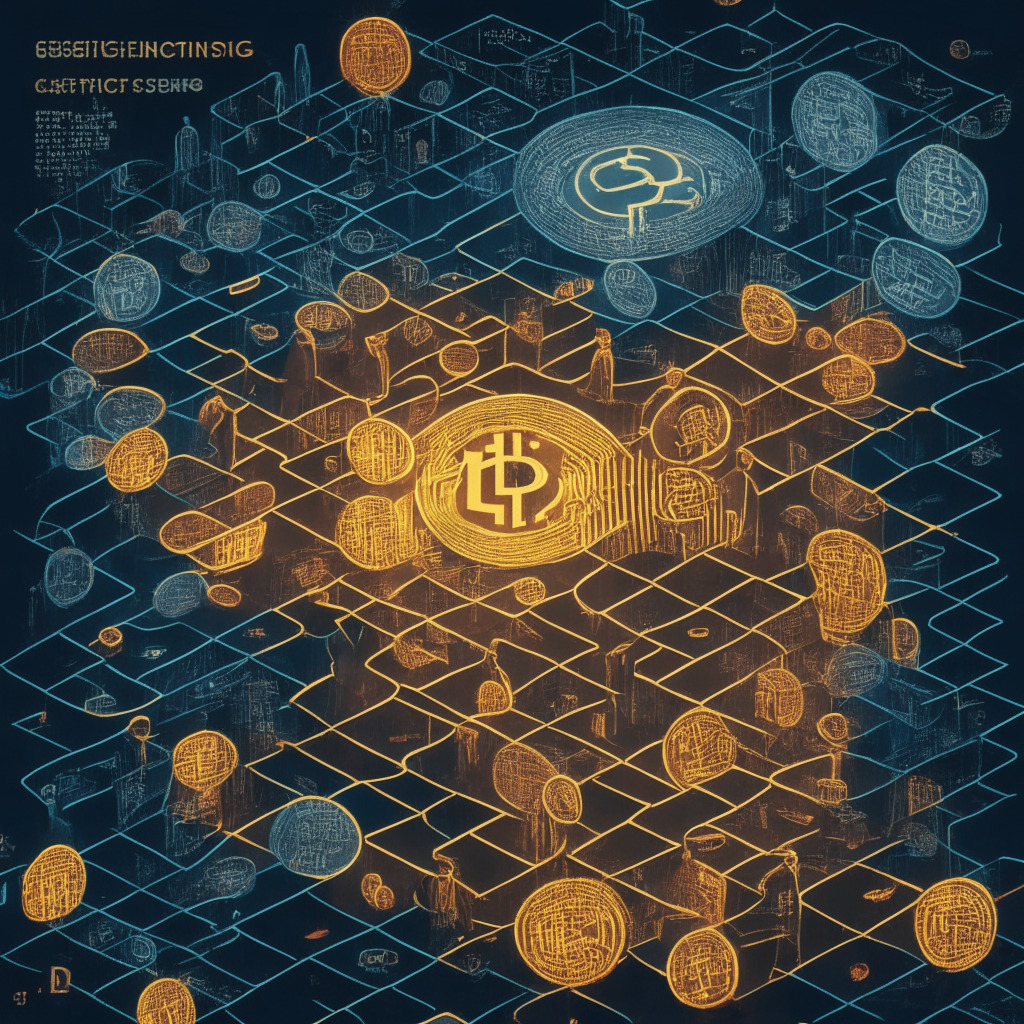The SEC’s actions against crypto firms like Coinbase and Binance have sparked debates on the future of these companies in the U.S. Some argue that regulatory pressures will bring clarity and benefit businesses, while others believe challenges could force firms to focus on more accessible jurisdictions, leaving smaller players behind.
Search Results for: SEPA
Coinbase vs SEC: Lawsuit Sets Stage for Crypto Securities Clarity & Future Regulations
The SEC’s lawsuit against Coinbase alleges that the exchange operates as a securities exchange, broker-dealership, and clearing house without registration, involving 13 cryptocurrencies classified as securities. The case outcome will set a precedent, shaping future regulations for the rapidly growing crypto sector.
SEC Lawsuits Against Crypto Exchanges: Compliance Battle or Decentralization Catalyst?
The SEC’s recent lawsuits against Binance and Coinbase raise questions about the future of crypto exchanges. As regulatory enforcement tightens over concerns regarding compliance, transparency, and customer protection, the effects on the crypto landscape may be far-reaching, with centralized exchanges possibly having to adopt more stringent KYC protocols and resemble fintech firms and banks.
Solana (SOL) in SEC Crosshairs: Impact on Price and Alternatives for High-Risk Crypto Investors
The SEC has labeled Solana (SOL) as a security amid lawsuits against Binance and Coinbase. SOL’s price dropped 10% and may face delisting from US exchanges. Despite the uncertainty, alternative high-risk crypto investments like yPredict’s $YPRED token presale emerge as attractive options.
Alabama Takes on Coinbase Staking: Striking Balance Between Regulation and Innovation
The Alabama Securities Commission (ASC) has ordered Coinbase to provide an explanation within 28 days regarding its staking program’s compliance with state securities laws. This follows separate legal action by the SEC accusing Coinbase of selling unregistered securities. The ASC’s investigation raises critical questions about the future of crypto staking programs, investor protection, and industry regulation.
SEC Crackdown on Coinbase and Binance: Striving for Regulation or Hindering Innovation?
The SEC moves against Coinbase and Binance highlight the need for increased regulation in the cryptocurrency landscape. Such actions pave the way for transparency and trust, promoting investor confidence and ensuring fair trading practices, despite concerns of stifling innovation.
Binance Lawsuit: SEC vs Crypto Titans – A Battle Over Regulations and Investor Protection
The SEC’s 136-page complaint against Binance includes testimonies from former Binance.US CEOs Catherine Coley and Brian Brooks, alleging faked trading volumes, wash trading, and improper controls. This high-profile lawsuit may significantly impact the future of crypto regulations in the US and worldwide.
Binance’s Regulatory Battle: A Test for Crypto Industry or Stifling of Innovation?
The SEC lawsuit against Binance led to a negative netflow of $778 million in Ethereum blockchain assets, impacting the crypto market and exchange’s balance sheet. This regulatory uncertainty may affect Binance’s reputation and raises questions about the appropriate regulatory framework for digital assets, hindering innovation or fostering long-term competition.
SEC vs Binance: Navigating the Gray Area of Crypto Regulation and Innovation
The SEC filed a civil suit against Binance, accusing its founder Changpeng Zhao and the then CCO of evading U.S. regulations and misusing customer accounts. This case highlights the broader issue of crypto regulation, raising questions about striking the right balance between fostering innovation and preventing potential abuses in the blockchain space.
Massive Bitcoin Bribe Exposes Dark Side of Crypto and Institutional Corruption
A high-ranking official within the Investigative Committee of the Russian Federation (ICR) reportedly received a $28 million Bitcoin bribe for protecting hackers under investigation. This high-profile case raises concerns about the potential use of digital currencies for illicit activities and highlights the risks of corruption within institutions designed to protect against such activities.
Binance Faces SEC Charges: Balancing Innovation and Compliance in Crypto
The SEC has charged Binance Holdings Ltd. and its US affiliates with multiple offenses, alleging blatant disregard for federal securities laws and placing investors’ assets at significant risk. The mounting regulatory pressure highlights the evolving landscape and the industry’s need to adapt practices to ensure market safety and stability.
Binance Executive’s Control Over Binance.US Bank Accounts: Challenging Claims of Independence
A recent report reveals that a Binance executive had significant control over Binance.US bank accounts, raising questions about the subsidiary’s proclaimed independence. Despite Binance.US asserting operational changes, the ongoing connection with its parent company fuels skepticism and concerns regarding their relationship and regulatory compliance.
Binance Lawsuit Sparks Debate: Balancing Regulation, Trust, and Innovation in Crypto
The SEC has accused Binance and its CEO, Changpeng “CZ” Zhao, of federal securities law violations, causing a net outflow of around $69 million. This raises essential questions about the right balance between regulation and innovation in the cryptocurrency industry.
XRP’s Strong Decoupling and Potential Ripple IPO: Analyzing Pros and Cons
XRP, the world’s sixth-largest cryptocurrency, recently showed a strong decoupling from the crypto market due to whale activity and investor interest. Speculations of a possible Ripple IPO are on the rise amid expectations of an XRP price rally beyond $0.60. However, prospective investors should remain cautious and conduct thorough research, as the cryptocurrency market is prone to sudden fluctuations.
Celsius Network’s ETH Staking Strategy Lengthens Queue for New Ethereum Validators
Celsius Network’s recent changes to its ETH staking strategy have exacerbated the already long queue for activating new validators on the Ethereum network. The company’s transfers have stretched the queue for establishing new validators now to 44 days, potentially adding almost an additional week due to Celsius actions.
Japanese Banks Embrace Yen-Pegged Stablecoins: Analyzing Opportunities and Challenges
MUFG’s Progmat Coin platform enables Japanese banks to launch Yen-pegged stablecoins on multiple public blockchains such as Ethereum, Polygon, Avalanche, and Cosmos. As new regulations take effect, banks are exploring or launching stablecoins, potentially advancing mainstream crypto asset acceptance.
Celsius Network’s ETH Staking Strategy: Impact on Validators and Ethereum’s Ecosystem
Celsius Network significantly alters its ETH staking strategy, causing an increased congestion in Ethereum’s validator activation queue. This move involves moving $745 million worth of ETH into staking contracts after redeeming $813 million from Lido Finance, impacting Ethereum’s ecosystem and adding pressure on the network.
Uniswap’s V3 Fee Switch Debated: Failed Proposal, Legal Concerns, and Timing Issues
A recent DAO community poll on a proposed Uniswap V3 fee switch by GFX Labs ended in a split vote, delaying the initiative despite majority support. The proposal sought to charge liquidity providers a fraction of fees across Uniswap V3 pools and redistribute earnings to the UNI community. The failed vote was attributed to incorrect structuring, but consensus for future fee switches appears to be growing.
Elon Musk’s DOGE Lawsuit, Silvergate Bank Liquidation, and CBN’s Crypto Ban: A Tumultuous Week in Crypto
Elon Musk faces a proposed class action lawsuit by investors alleging manipulation of Dogecoin (DOGE) cryptocurrency, causing billions in losses. Meanwhile, private bank Xapo integrates with the SEPA network, and the US CFTC invites comments on risk management program changes.
Crypto Scandals of 2022: Lessons Learned and the Path to Transparency
The collapse of major crypto companies, including FTX, due to weak balance sheets and intertwined operations, has fueled skepticism about crypto’s underlying technology. However, this highlights the need for increased transparency, accountability, and investigative journalism to maintain trust in the industry, ensuring future growth and stability.
2024 Presidential Election: Crypto Regulation Takes Center Stage in Debates
The 2024 US presidential election could witness discussions on crypto market regulation taking center stage, impacting the US’s position as a global crypto hub. Prospective candidates like Ron DeSantis and Robert F. Kennedy Jr. openly support digital asset trading freedom, while JP Morgan CEO Jamie Dimon’s potential candidacy raises questions about cryptocurrency’s role in the American financial landscape.
Georgia’s Crypto Surveillance: Preventing Money Laundering or Stifling Innovation?
Georgia plans to commence mandatory supervision of virtual asset service providers (VASPs) starting Sept. 1, 2023, to prevent money laundering and comply with sanctions. Alongside VASP supervision, foreign bank account restrictions will be implemented to support Georgia’s economic stability. The country also prepares to approve cryptocurrency regulations, aiming to establish itself as a global crypto hub.
MiCA Rules Signed: Balancing Crypto Regulation and Innovation in the EU
The European Union’s Markets in Crypto-Assets (MiCA) rules have been signed into law, introducing a comprehensive regulatory framework for cryptocurrencies. The new regulations aim to prevent money laundering and provide regulatory clarity while maintaining a balance between innovation and necessary controls in the rapidly growing crypto market.
Multichain Drama: Arrest Rumors, Locked Servers, and Suspended Services Unravel Crypto Startup
Crypto startup Multichain faces challenges after rumors of team members’ arrests and loss of communication with their CEO, Zhaojun. With affected cross-chain services, uncertainty surrounds users’ fund accessibility and private key control. Connection to recent arrests in China remains unconfirmed.
Digital Asset Regulation: Bridging the Divide Between CFTC and SEC in Upcoming Congressional Hearing
US lawmakers will discuss “The Future of Digital Assets: Providing Clarity for Digital Asset Spot Markets” in a congressional hearing on June 6. Collaboration between regulatory committees like the CFTC and SEC is essential to address concerns in the digital assets space, focusing on effective guidelines and fostering innovation while safeguarding consumer interests.
Chatting with Satoshi: AI Bot Talk2Satoshi Sparks Insight and Confusion in Crypto Community
Pierre Corbin and Hugo Ferrer have created “Talk2Satoshi”, an AI chatbot designed to answer questions about Bitcoin and economics as if from Satoshi Nakamoto. Based on OpenAI’s ChatGPT, it demonstrates AI tools’ potential for education, encouraging healthy discussions among crypto enthusiasts despite occasional uncertainties and contradictions.
Exploring FDUSD: A New Stablecoin Amid Regulatory Uncertainty and Its Future Prospects
First Digital Group announces the launch of FDUSD, a new USD stablecoin issued on Ethereum and BNB, backed by cash and cash equivalents. This aims to provide a secure and efficient digital currency for everyday transactions, though retail users in Hong Kong will not have access due to pending regulations.
The Dark Side of NFT Influencers: Responsibility, Scams, and Trust in Web3 Community
Social media influencers in the NFT space hold significant responsibility as their actions influence their audience’s decisions on buying or selling NFTs. This becomes problematic when they unintentionally promote scams, such as the recent Pixel Penguins NFT collection, raising questions about their role as trusted thought leaders in the crypto and NFT community.
AI Token Mania: The Real Deal or Just Hype? Pros, Cons, and Key Conflicts Explored
The AI mania has generated demand for AI crypto tokens like RNDR and AGIX, with values surging. However, industry experts question the compatibility between AI and crypto technologies, and whether this trend will result in lasting demand for AI tokens.
Digital Euro: Integrating into Payment Systems and Balancing Innovation with Privacy Concerns
The European Central Bank (ECB) has advanced its digital euro investigation, with market research and prototyping exercises demonstrating European providers’ potential to develop digital euro solutions. The ECB’s Governing Council will decide in autumn 2023 whether to proceed with a preparation phase for a central bank digital currency (CBDC) in the region.
IRS Gains Access to Coinbase User Data: Balancing Privacy and Regulation in Crypto
A recent US Federal court ruling allows the Internal Revenue Service (IRS) to access Coinbase user data, legitimizing cryptocurrency within the financial sector and aiding in tax evasion checks. However, concerns arise over privacy and individual rights as IRS access may create unease among investors.
Crackdown on South Korean Crypto Scams: Uncovering $350M Fraudulent Operations & Trust Issues
South Korean police dismantled two cryptocurrency scams worth $350 million, affecting hundreds of victims. The first case involved a “virtual fashion items” marketplace, luring 435 victims into investing $333 million. The second scam swindled investors out of $27 million. These incidents raise concerns over the commitment of crypto businesses to customer protection and the effectiveness of regulations.































